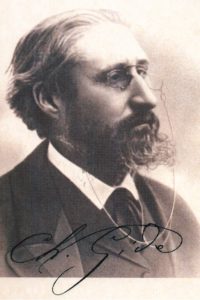Call for papers Gide Workshop 2023
8-10 June 2023, Lyon
Anniversary Edition: 40 years of the creation of Charles Gide Association
French Economists and the Transformations of Economic Analysis: From Charles Gide to Esther Duflo
The history of economic thought has long identified notable differences between national traditions – American (Barbour, Cicarelli and King 2017), Spanish (Almenar and Llombar 2009), Italian (Faucci, 2014), Portuguese (Psalidopoulos and Mata 2002), Irish (Boylan, Prendergast and Turner 2015), Russian (Barnett 2009, Hagemann and Avtonomov 2022) among others. French economic thought has long stood out around strong markers (Dockès, Frobert, Klotz, Potier and Tiran (eds.) 2001, Breton and Lutfalla 1991). Until 1945, debates were lively between declining but still influential liberal economists and a growing heterodoxy, marked in particular by the contributions of Charles Gide; economist engineers contributed to the most sophisticated developments in mathematical economics (Maurice Allais, René Roy), in line with their predecessors Jules Dupuit, Clément Colson and François Divisia; and the monetary debates are rich and fruitful (Jacques Rueff, Bertrand Nogaro, Albert Aftalion, Charles Rist).
After 1945, the center of gravity of economic thought shifted to the United States. The discipline is becoming more international and national specificities are diminishing. France nevertheless retains strong specialties, in the field of macroeconomics (Edmond Malinvaud, Maurice Allais), general equilibrium models (Gérard Debreu, Jean-Michel Grandmont), national accounts (Pierre Uri, Charles Prou), decision theories (Maurice Allais), industrial economics (Marcel Boiteux), international economics (François Perroux) and sees the development of influential critical currents (schools of regulation with Robert Boyer or Bruno Théret, economics of conventions with Olivier Favereau or André Orléan). More recently, French economists have distinguished themselves in the study of social justice and inequalities (Serge-Christophe Kolm, Thomas Piketty, Emmanuel Saez, Gabriel Zucman), in monetary economics (Michel Aglietta, Jean Cartelier), in public economics (Jean Tirole, Jean-Jacques Laffont), in the implementation of randomized experiences (Esther Duflo). Some have done all or part of their intellectual career abroad, especially in the United States (Olivier Blanchard, Thomas Piketty, Gabriel Zucman, Ester Duflo), while others have founded or developed research centres and schools in France (Jean Tirole, Robert Boyer). Finally, women economists have started to become visible, some of them obtaining important scientific recognition (Ester Duflo, Stefanie Stancheva).
On the occasion of the 40th anniversary of the Gide Association, the workshop will honor the thinking of French economists since the end of the 19th century, by questioning their contributions to the transformations of economic analysis at different times.
Proposals may adopt one of the following perspectives:
- a global and/or comparative approach, emphasizing for example the links between different national traditions;
- a study on particular institutions (the role of research centers, seminars, conferences in the development of French economic thought could be presented);
- work on the contributions of one or more particular French-speaking authors or economic actors, economists or having contributed to economic thought (work on women will be particularly appreciated, for example, Marthe Hanau, Amélie de Dietrich, Jeanne Bouvier, Lucie Aubrac, Esther Duflo, Hélène Rey, Stefanie Stantcheva)
Articles may deal with a wide variety of themes (women and economics, public debt, macroeconometrics, the development of new forecasting tools, experimental economics and decision theories, among others) when they cover the period from 1850 to the present day. Work on methodology or economic philosophy will be appreciated as well.
Each article proposal (in French or in English) must contain no more than 500 words. Proposals for entire sessions are welcome. The presentations will be face-to-face (in Lyon), mainly in French.
A selection of articles will be published in a special issue of the Revue d’histoire de la pensée économique.
Calendar
- Submission of proposals before February 1, 2023
- Response to proposals on March 15, 2023
- Sending of the final texts before May 15, 2023
Submission of proposals
Proposals for papers and/or sessions must be made on the Gide Days website: https://gide2023.sciencesconf.org/
Log in or create an account on sciencesconf.org
Then click on “Submit a contribution” (left column)
Conference website: https://gide2023.sciencesconf.org
Contact: journeesgide2023@gmail.com
Scientific Committee:
François Allisson, Université de Lausanne
Richard Arena, Université Côte d’Azur
Michaël Assous, Université Lumière Lyon 2
Laure Bazzoli, Université Lumière Lyon 2
Jérôme Blanc, Sciences Po Lyon
Laurie Bréban, Université Paris 1 Panthéon-Sorbonne
Nicolas Brisset, Université Côte d’Azur
Nicolas Chaigneau, Université Lumière Lyon 2
Clément Coste, Sciences Po Lyon
Joachim De Paoli, Université Jean Moulin Lyon 3
Till Düppe, UQAM
Véronique Dutraive, Université Lumière Lyon 2
Judith Favereau, Université Lumière Lyon 2
Raphaël Fèvre, Université Côte d’Azur
Ludovic Frobert, CNRS
Rebeca Gomez-Betancourt, Université Lumière Lyon 2
Alexandra Hyard, Université de Lille
Gérard Klotz, Université Lumière Lyon 2
Charlotte Le Chapelain, Université Jean Moulin Lyon 3
Matari Pierre, UNAM
Jean-Pierre Potier, Université Lumière Lyon 2
Javier San Julian, Université de Barcelone
Claire Silvant, Université Lumière Lyon 2
Ricardo Soliani, Université de Gênes
Organising committee:
Michaël Assous, Laure Bazzoli, Juliette Blayac, Nicolas Chaigneau, Clément Coste, Joachim De Paoli, Véronique Dutraive, Judith Favereau, Rebeca Gomez Betancourt, Charlotte Iseppi, Pierre Jean, Claire Silvant and Matéo Teixeira.
